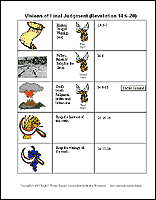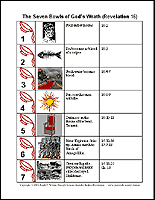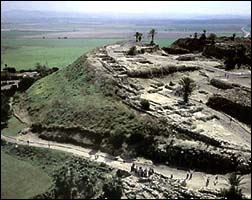
|
Old Testament
New Testament
Gospels
Acts
Paul's Letters
General Letters
Revelation
Topical Studies
Beginning the Journey (for new Christians). en Español

|
Old Testament
New Testament
Gospels
Acts
Paul's Letters
General Letters
Revelation
Topical Studies

|
Home
Bible Studies
Articles
Books
Podcasts
Search
Menu
Donate
About Us
Contact Us
FAQ
Sitemap
#6. Alas, Babylon! (Revelation 14-18)
Audio (30:52)
  Download and print out to take notes on both the Visions of Final Judgment chart and the Seven Bowls of Wrath chart. |
As history races to its final conclusion we see a great homecoming and rejoicing in heaven and massive wailing and judgment on earth.
- The Lamb and the 144,000 in heaven
- Three angels announcing grace, doom, and warning
- The harvest of the righteous on the earth
- The harvest of the wicked on the earth
- The Seven Bowls of God's wrath upon the earth
- A vision of Babylon as a prostitute
- The fall of Babylon
What seemed so exciting and glorious about a prosperous city and its world trade now turns to doom as the city falls and burns. The glitter of the world is tarnished as the true glory is revealed. Let's examine these visions.
The Lamb and the 144,000 (14:1-5)
14:1 "144,000" are sealed in their foreheads, in contrast to the followers and worshippers of the beast. In 7:3-4 they seemed to be on the earth. Now they are before the throne of God in heaven. See my notes on 7:3 in Lesson 4 concerning the identity of the 144,000 as the whole Church.
14:3-5 A number of characteristics of these 144,000 are given:
- "Redeemed from the earth" (5:9-10).
- "Chaste," Greek "virgins." This probably refers to either those who refrained from adultery or sexual immorality (see the temptations in the churches of Pergamum and Thyatira, chapter 2), or those who have kept themselves pure from all defiling relationships with the pagan world system. Compare 2 Kings 19:21; Jeremiah 18:13; 2 Corinthians 11:2; Revelation 17:2; 21:9. However, this symbol differs from the usual depiction of Israel as a female virgin, betrothed or married to Yahweh.
- "Follow the Lamb wherever he goes" (Mark 8:34; John 10:27).
- "First fruits." The word can be used as the beginning of the harvest with more to follow (1 Corinthians 15:20, 23), but also as that portion of the harvest which is wholly dedicated and given as an offering to God (James 1:18; Jeremiah 2:3).
- "No lie." See 22:15; 21:27; Zephaniah 3:13. Truthfulness is characteristic of the Messiah's followers.
- "Spotless," ethically blameless (Ephesians 1:4; 5:27; Colossians 1:22). We are made spotless before God only by washing our robes in the atoning blood of the Lamb (7:14). "This cup is the new covenant in my blood, which is poured out for many for the forgiveness of sins" (Matthew 26:28).
In short, I believe these 144,000 are not a select group, but an ideal representation all Christians who are followers of the Lord.
|
Q1. (14:3-5) In what ways do the 144,000 provide an ideal for all Christians to emulate?
|
The Three Angels (14:6-13)
14:6 "An angel flying in midheaven." Three angels present three interrelated and progressive proclamations:
- Summons to worship God,
- Prediction of the downfall of the great capital city of paganism, and
- A vivid portrayal of those who worship the beast.
14:8 "Babylon the great." As the ancient Mesopotamian city had become the political and religious capital of a world empire, noted for its luxury and moral corruption, so Rome was a contemporary Babylon, the great enemy of God's people in New Testament times. More on this in Chapter 18. In Jewish and Christian circles, "Babylon" was becoming a symbolic title for Rome, with examples in 1 Peter 5:13 and other apocalyptic literature of the time (J.N.D. Kelly, Epistles of Peter and of Jude [Harper's NT Commentaries; Harper, 1969], p. 218.)
14:10 "The wine of God's wrath," a common Old Testament metaphor of divine punishment (Job 21:20; Psalm 75:8; Isaiah 51:17; Jeremiah 25:15-28).
"Tormented with fire and sulfur," recalls the judgments on Sodom and Gomorrah (Genesis 19:24; Luke 17:29-30; Revelation 19:20; 20:10; 21:8).
14:11 "Torment ... for ever and ever ... no rest." Eternal punishment is the antithesis of eternal life and rest. As one is conscious, so is the other. This is not unloving, but the logical requirement of justice for those who have rebelled against their Maker and spurned his mercy. It is difficult for moderns to understand such awesome justice. We are more merciful than that, we say. But Jesus himself -- the Master of mercy, the very One from whom we learned to be merciful -- used very similar language to describe hell. See Matthew 25:41, 46; 26:24; Mark 9:43-49; Luke 16:19-31; 2 Thessalonians 1:5-10.
|
Q2. (14:10-11) Why is everlasting punishment so difficult for us Christians to accept? In what ways might eternal punishment be considered just punishment?
|
14:13 "Blessed are the dead who die in the Lord henceforth." An encouragement to those who are called upon to face martyrdom for their endurance (14:12).
The Harvest of the Earth (14:14-20)
14:14 "One like a son of man." This phrase is quoted from Daniel 7:13, and no doubt refers to the Messiah, who called himself "the Son of Man."
14:15 "Put in your sickle and reap for the harvest of the earth is fully ripe." See Joel 3:13. This harvest may include both the righteous (Matthew 9:37-38; Mark 4:29; John 4:35-38) and the unrighteous (Matthew 13:30, 40-42; also Jeremiah 51:33; Hosea 6:11). This is a general picture of coming judgment.
14:19 "The winepress of the wrath of God." This is surely not a mixed harvest, but stressed the violent carnage of the judgment of the Messiah at his coming (Revelation 19:11-21; Joel 3:13-14; Isaiah 63:3; Lamentations 1:15). This passage has inspired several Christian hymns, among which are:
- "The Battle Hymn of the Republic," by Julia Ward Howe:
"Mine eyes have seen the glory of the coming of the Lord;
He is trampling out the vintage where the grapes of wrath are stored;
He hath loosed the fateful lightning of His terrible swift sword;
His truth is marching on.
"He has sounded for the trumpet that shall never sound retreat;
He is sifting out the hearts of men before His judgment seat...."
- "Come, Ye Thankful People Come" by Henry Alford, which we commonly sing at Thanksgiving, includes the theme of the harvesting of the wheat and the tares.
Seven Angels with Seven Plagues (15:1-8)
15:1 "Seven plagues which are the last." The bowl plagues are total, in contrast to the seals (1/4 destroyed; chapters 6 to 8) and the trumpets (1/3 destroyed; chapters 8 to 9). The opportunity for repentance is gone. These have rejected the Lamb and worshipped the beast, now hardened in their impenitence. Instead of repentance or awe (11:13), their response is to curse God (16:9, 11, 21). Notice the parallels with the plagues and deliverance of Exodus.
15:2 "Those who had conquered the beast." See 12:11; 13:15. They conquered by not denying their Christ upon pain of death. What more could Satan do to them? See Matthew 10:28-33.
15:3 "The song of Moses ... and the song of the Lamb." The saints on the shore of the sea of glass sing a song celebrating God's victory, just as Moses and the people of Israel did on the shores of the Red Sea (Exodus 15:1-18). This is not two but one song celebrating God's righteous and redemptive work beginning with Moses and culminating in the Lamb.
I am impressed with all the praise we are shown in heaven. Much of it sounds like praise choruses: a personal, direct worship of God for his righteousness and worthiness.
|
Q3. (15:3-4) We see singing and praise in heaven before the throne a number of times in Revelation (4:8, 11; 5:9-10, 12-13; 7:12; 11:17-18; 15:3-4; 19:1-3). What do you learn about appropriate worship from studying these songs? Do you recognize any contemporary songs that seem similar to these?
|
15:5 "The tent of testimony" (Exodus 38:21; Numbers 1:50) contained the two tables of testimony, the Ten Commandments, God's covenant with Israel. This is another reference to the typology of the Exodus deliverance.
15:7 "Seven golden bowls." Greek phiale, like our word "vial". But this is not like our "vial", but a wide shallow bowl or cup, usually without a stand or foot.
15:8 "The temple was filled with smoke." See Exodus 19:18; 40:34; 1 Kings 8:10-11; Isaiah 6:4.
The Seven Bowls of God's Wrath (16:1-21)
16:2 "Foul and evil sores." "Sore, abscess, ulcer" (BDAG 317-318). See the sixth Egyptian plague (Exodus 9:9-11). Only the beast's followers suffer; God's people are protected.
16:3 "Sea ... became like the blood of a dead man," that is, coagulated and rotting. See the first Egyptian plague (Exodus 7:20-21) and the second trumpet (8:8-9).
16:4 "Rivers and fountains became blood." Similar to the third trumpet (8:10-11) but now afflicts all the fresh water.
16:6 There is a grim appropriateness in this plague. Those who shed Christian blood must now drink blood.
16:7 "The altar," here personified, reminds us of the cry of the martyrs for justice (6:9; 8:3-5). The opportunity for mercy is past.
16:8 "Scorch men with fire." The sun once darkened (8:12) now brings the judgment of fire (Deuteronomy 28:22; 1 Corinthians 3:13; 2 Peter 3:7, 10). Contrast the protection of the saints in 7:16.
16:10 "The throne of the beast ... its kingdom was in darkness." This supernatural darkness is directed against the Antichrist's godless, worldly domain. There is torment and his followers are confused but impenitent. See the ninth Egyptian plague (Exodus 10:21-23).
16:12 "The great river Euphrates ... dried up to prepare the way for the kings from the East." God sets the stage for the final conflict in which the world's armies are slain. See Exodus 14:21; Joshua 3:14-17.
16:13 "The false prophet" is "the beast from the earth" (13:11-18), the religious power supporting the civil power of the Antichrist. See Revelation 13:14; 19:20; 20:10.
 The Tell of Megiddo (Armageddon) rising above the Jezreel Valley where the final battle will be fought. |
16:14 "The kings of the whole world ... assembled for battle." The ten kings first make war on Babylon and destroy it (17:16-18). Then they gather for battle against the Lamb. The result of the battle is given in 19:11-21. Demonically inspired to battle, the kings and their armies are destroyed by the conquering Messiah, and the beast and false prophet are thrown into the lake of fire. These kings may include Gog, ruler of Magog (Ezekiel 38-39), also referred to in Revelation 20:7-8. See also Zechariah 14:1-5 and Joel 3:2.
16:15 "Like a thief." See 1 Thessalonians 5:2; Matthew 24:42-44; 2 Peter 3:10; Revelation 3:3. This may be an indication that Christians are still present on the earth.
16:16 "Armageddon," Hebrew for "the hill of Megiddo," probably the tell mound of the ancient city of Megiddo about 70 feet high, overlooking the Valley of Jezreel, the site of many great Old Testament battles.
16:18 "A great earthquake" destroys Babylon and all the cities of the nations. Babylon has first been burned by the ten kings (17:16-18), and now is destroyed by earthquake with the kings' cities. It seems that the sixth and seventh bowls are detailed in chapters 17-19.
16:21 "Hailstones." See Joshua 10:11; Ezekiel 38:22; Revelation 8:7; 11:19.
The Woman on the Beast (17:1-18)
17:1 "The great harlot." Wilcox (pp. 156-160) notes the various characteristics of the Whore of Babylon:
- Influential. She is enthroned over all the nations (17:1-2, 15), and has the inhabitants of the earth and their kings in her power. All are taken in by her wiles.
- Evil. The power that supports her is the Antichrist of Satan (17:3).
- Attractive (17:4). The simple soul is likely to be dazzled by the Beauty before he notices the Beast. Even John finds himself marveling (17:6b).
- Repulsive. What has made her drunk is her apparent victory over those who witness to the Christian truth she hates (17:6a), and for that she will be shunned by all who hold truth dear.
Who is this Whore of Babylon? She is Rome (17:9, 18), but she is more than that. She represents, human civilization -- the world with all its wealth, power, and luxury -- organized in opposition to God (1 John 2:15-17). Jesus was offered "Babylon" and rejected its temptations in Matthew 4:8-9. The Whore of Babylon has as her opposite the pure Bride of Christ (19:7-9) and the Holy City of God, New Jerusalem (chapters 21-22).
- Harlotry is a common Old Testament symbol for religious apostasy (Isaiah 1:21; 23:16-17; Ezekiel 16:15-18; Nahum 3:4) that which allures, tempts, seduces, and draws people away from God.
- Babylon is a worldly city. In Revelation 18:11-15, Babylon is seen as a great commercial metropolis. This indicates the world as a center of industry, commerce, art, culture -- the embodiment of "the lust of the flesh, the lust of the eyes, and the pride of life" (1 John 2:16; see Luke 8:14).
- Babylon in John's day was embodied in Rome, "the city on the seven hills" (17:9). Yet, though its form changes from one period of history to another, its essence remains. Babylon is the world as the center of antichristian seduction at any time in history (Hendriksen). The call, "Come out of her, my people, lest you take part in her sins, lest you share in her plagues," is as imperative for us today as it was for the rich, adulterous, idolatrous Christians of the churches of Asia (chapters 2-3; see 2 Corinthians 6:16-18). "Be zealous and repent. Behold I stand at the door" (Revelation 3:19-20).
- The Whore's golden cup (17:4) which she offers contains nothing but abominations to lead people away from God and defile them.
17:2 "many waters" = "peoples, multitudes, nations, and tongues" (17:15).
17:3 "Scarlet beast" = the beast from the sea (13:1), the Antichrist, now with the blood-red color of its master, the red dragon.
17:8 "The beast ... was, and is not, and is to ascend from the bottomless pit and go into perdition." This is a parody of the Lamb (1:4, 8; 4:8). The beast's present absence is probably due to the mortal wound on one of his heads (13:3, 12, 14), from which he recovers. The Battle of Armageddon is his last rise and banishment to perdition (that is, destruction), the lake of fire (19:19-21).
17:11 "It is an eighth, but it belongs to the seven." The beast's own reign as Antichrist is separate, but similar to and a culmination of the reign of the seven kings/kingdoms (see Daniel, chapters 2 and 7, Ladd 229-230; Hendriksen, 204-205; Alford 4:710-711).
17:12 "Ten horns ... are ten kings." These are colleagues and supporters of the Antichrist for a short time, one hour. They gather for the Battle of Armageddon where they are defeated (17:14; 19:11-21).
17:16 The ten kings and the Antichrist now attack the city which has world dominion and destroy it. Babylon once held ascendancy, Rome in John's day. Which is it today? Washington? London? Paris? Is America the center of present-day Babylon? (17:18).
The Fall of Babylon (18:1-24)
Chapter 18 is a series of dirges raised over the fallen city of Babylon. The imagery is drawn from a number of Old Testament themes and passages.
18:2 Isaiah 13:21-22; 21:9; Revelation 14:8.
18:4 Isaiah 52:11; Jeremiah 51:45; 2 Corinthians 6:17.
|
Q4. (18:4) We Christians are instructed to be "in the world" but not "of the world" (John 17:15-19). One interpretation has been to be hermits, ascetics, to distance ourselves from the political process, and to adopt stringent dress and behavior codes. Another interpretation is to be "salt and light" (Matthew 5:13-16) in the world so that we might bring about cleansing and change through God's spirit. Where do you think the balance lies? How and when should we fulfill the command, "Come out of her, my people, so that you will not share in
her sins...."?
|
18:7 Isaiah 47:7-8.
18:9-19 Compare Ezekiel 27. The kings of the earth, whose political destinies were tied with Babylon's, mourn (18:9-10). Then the merchants who will be ruined by a loss of their lucrative markets mourn (18:11-17a). Finally the shipping industry which supplied her transportation network mourns at this loss of trade (18:17b-19).
18:21-24 This passage recalls the prophetic act of Jeremiah the prophet concerning literal Babylon (Jeremiah 51:59-64). Babylon sinks to rise no more. Now violence reigns, followed by stillness (see Jeremiah 25:10).
18:24 The blood of prophets and of saints is finally avenged.
Prayer
Father, show us how to live fully in your Kingdom while we dwell in the midst of this corrupt and luxurious world. Show us how to love rather than to remain aloof. Show us how to be Jesus' servants in this very needy world. In Jesus' name, we pray. Amen.References and abbreviations and Reprint Guidelines
Copyright © 2025, Ralph F. Wilson. <pastor![]() joyfulheart.com> All rights reserved. A single copy of this article is free. Do not put this on a website. See legal, copyright, and reprint information.
joyfulheart.com> All rights reserved. A single copy of this article is free. Do not put this on a website. See legal, copyright, and reprint information.


 To be notified about future articles, stories, and Bible studies, why don't you subscribe to our free newsletter, The Joyful Heart, by placing your e-mail address in the box below. We respect your
To be notified about future articles, stories, and Bible studies, why don't you subscribe to our free newsletter, The Joyful Heart, by placing your e-mail address in the box below. We respect your